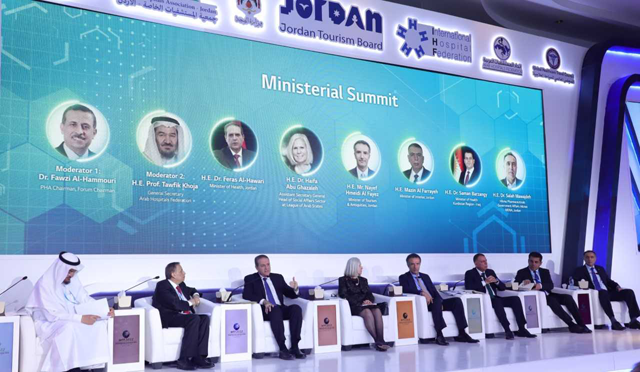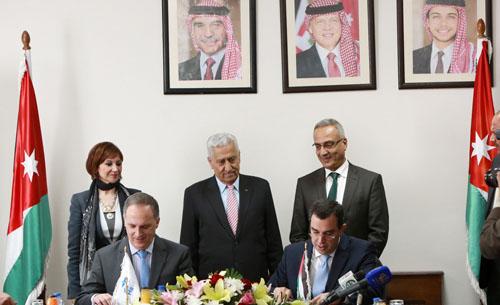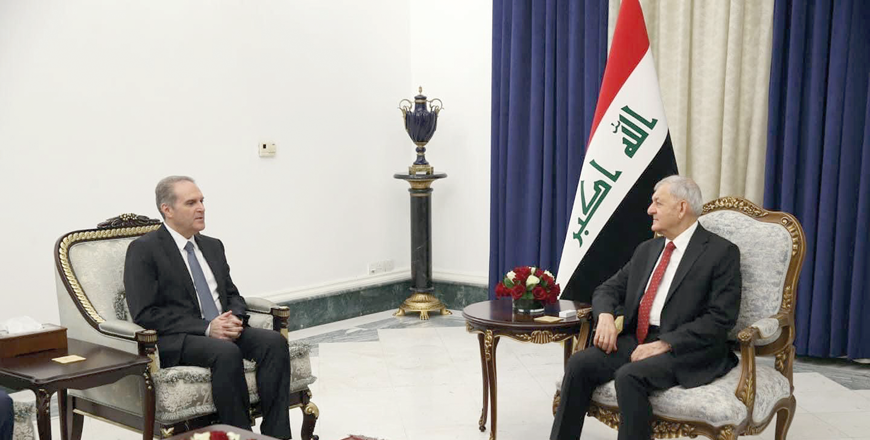You are here
King directs government to address challenges facing medical sectors
By JT - Jan 14,2015 - Last updated at Jan 14,2015

AMMAN — His Majesty King Abdullah on Wednesday expressed his satisfaction with the “advanced level of the Kingdom’s medical sector and pharmaceutical industries”.
At a meeting with representatives of the medical and pharmaceutical sectors in the Kingdom, held at Al Husseiniya Palace, the King stressed the importance of building on previous accomplishments achieved in this field in a manner that boosts the country’s reputation in therapeutic tourism, at the regional and international levels.
King Abdullah commended the efforts of workers in both sectors, which helped make Jordan a major destination for healthcare services and enabled Jordanian pharmaceutical products to enter more than 60 countries, according to a Royal Court statement.
At the meeting, attended by Prime Minister Abdullah Ensour, the King said the government should deal with the various challenges facing the two sectors and take appropriate decisions to guarantee that the best services are extended to Jordanians and the country’s visitors.
The sectors’ representatives lauded His Majesty’s gesture to meet with them and listen to their remarks on the situation of both industries. They also voiced appreciation of his frequent directives to the government to work in partnership with the private sector in a manner that serves higher national interests.
The attendees spoke about the challenges facing each sector and suggested legislative proposals and procedures that should be adopted to overcome current challenges and to maintain the Kingdom’s “excellent reputation and high ranking in the fields of therapeutic tourism and pharmaceutical industries at the regional level”.
They highlighted the need to enter new markets, especially for pharmaceutical products whose sales have dropped compared to previous years, besides the need to amend relevant laws to facilitate more progress and development in the medical sector.
They stressed the importance of activating and supporting the Higher Medical Council to pursue its role in dealing with various concerned entities to further develop therapeutic tourism and benefit from the Jordanian expertise in this field, highlighting the Kingdom’s stability and security as a main advantage in this regard.
They also recommended that private sector hospitals be computerised like public sector hospitals, and highlighted the need for a specialised centre to support medical research.
Moreover, they asserted the importance of speeding up endorsement of the law on medical accountability, which would be “a big step to regulate the health sector and safeguard workers’ rights”.
Royal Court Chief Fayez Tarawneh, Director of the King’s Office Jafar Hassan and Health Minister Ali Hiasat were present at the meeting.
The two sectors were represented by Jordan Medical Association President Hashem Abu Hassan, President of Private Hospitals Association Fawzi Hammouri, President of the Jordanian Association of Pharmaceutical Manufacturers Salah Mawajdeh, President of the Health Care Accreditation Council of Jordan Mahmoud Al Sarhan, Chairman of the Electronic Health Solutions “Hakeem” Saeed Darwazeh, CEO of Hakeem Rami Adawan and Chairman of Royal Health Awareness Society Rami Farraj.
In remarks to the Jordan News Agency, Petra, following the meeting, Hiasat said that despite the progress made by the medical sector in Jordan, there have been some challenges “which we presented to His Majesty today”.
The minister noted that his ministry is working on legislative amendments to streamline the industry to enhance partnership among all the components of the sector and better qualify doctors.
He added that the issue of the two aircraft the King has recently ordered to put to service as air ambulances was also discussed.
Mawajdeh told Petra that his association is drafting an overall strategy for the sector, aimed at taking the pharmaceutical industry to new levels to produce medications for cancer and biomedicines and expand its exports to new promising markets in Africa and South America.
He noted that the major challenges to the industry have to do with intellectual property issues, the regulatory burden and rising energy costs, stressing that the pharmaceutical manufacturers “have, nevertheless, adapted to these challenges and penetrated international markets”.
Abu Hassan said main players in the industry can build on its achievements and cooperate to “double revenues from medical tourism”.
Related Articles
AMMAN — Deputising for His Majesty King Abdullah, Health Minister Feras Al Hawari on Saturday inaugurated the 2022 International Healthcare
AMMAN — The government on Monday signed a five-year framework agreement with the Electronic Health Solutions Company (EHS) to regulate the i
AMMAN — Iraq's President Abdul Latif Rashid on Sunday met with Jordan's Minister of Health Firas Al Hawari.During the Baghdad-held meeting,



















